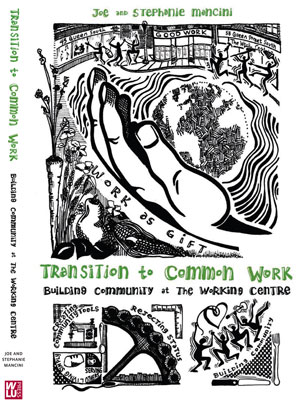IN 1982, Joe and Stephanie Mancini settled in Kitchener, Ontario, after a volunteer stint in Tanzania. The small city was faced with crippling unemployment as plant closings across North America wiped out many of the jobs that had supported thriving local economies.
The young couple responded strongly to the disrupted lives they saw around them. Their plans to become teachers were shelved, replaced with a determination to do something to make a difference for the many poor and unemployed in the region. Connections with a group working to help immigrants and refugees led them to their first small space where people looking for work or other support found a warm welcome. It was a place to sit, with coffee, newspapers, information about ESL and other programs, a telephone, a message board and, perhaps most important, someone who wanted to listen, who understood their needs and stories.
Transition to Common Work: Building Community at the Working Centre tells the story of how that initial commitment to creating a welcoming, supportive and inclusive place-to-be (now sometimes called a “third space”) unfolded to shape individual lives, myriad interpersonal relationships and, eventually, a special way of living and working. This book has much to teach us today as people’s expectations about work and way of life are being upended yet again.
In the 30 years since its formal establishment, the Working Centre has grown slowly but steadily, involving people from every strand of the fabric of Kitchener life.
In the 30 years since its formal establishment, the Working Centre has grown slowly but steadily, involving people from every strand of the fabric of Kitchener life. From the un- and under-employed through church and labour stalwarts to politicians, university folk, business leaders and artists – many have been drawn to become part of the Working Centre community.
In her perceptive foreword to the book, innovation analyst Dr. Frances Westley recalls her curiosity after visiting the Working Centre and talking at length with the Mancinis:
“[I]t was clear that something unusual was going on, but it was not clear how. How could these two gentle, kind, responsive, and unassuming people have produced what felt like an empire of innovation – including multiple renovated buildings and interlocking initiatives – from the restaurant to the gardens to the St. John’s Kitchen, to the outreach program”
Westley concluded that
“What this book contains cannot be described as a formula, but it does describe the alchemy that a selfless and dedicated few can ignite and therefore holds lessons worth learning for all those who are unhappy with the world as it is and who believe that change is possible.”
As with any sort of alchemy, the magic is in the details, which emerge in this book from the voices and stories of individuals’ struggles and the triumphs of mutual help, cooperation and friendship. Building community is an ongoing challenge, whether in your neighbourhood, your workplace or your city. This story of the Working Centre makes clear that engaging and including all comers in many kinds of “good work” for the common benefit is key to individual actualization as well as long-term community sustainability.
A concern with moral and social justice was central to the inception of the Working Centre. Its founding principles are embodied in six “virtues” that served as its foundation and guided its development: work as gift; living simply to leave more room for the other; serving others; rejecting status; building community and creating community tools. Chapter four elucidates these seemingly simple principles and following chapters detail the “ethical imagination” underlying the Centre’s egalitarian salary structure and the remarkable “community tools” that instantiate the Working Centre’s philosophy: a thriving thrift store, a commons with café and book store, a used-clothing boutique, computer and bicycle repair/recycling facilities, successful catering and market-garden enterprises. All offer work that is fulfilling, not least because it benefits the whole region.
Not surprisingly, the importance to human well-being of how work is rewarded is a central theme of Transition to Common Work.
“The Working Centre has endeavoured to create a level playing field so that each worker can reach their potential.”
“The Working Centre has endeavoured to create a level playing field so that each worker can reach their potential. Our work culture has been enhanced by not linking salary to a performance evaluation…We have seen that happiness and satisfaction do not come from getting ahead or triumphing over colleagues, but from making one’s community a better place and from the personal recognition of a job well done.”
Extreme consumerism, fueled by advertising and a hyper-competitive culture, is often seen as a potent enemy of a meaningful life. Under its spell, “We think we have to work for [more] money when in fact most people would rather work to learn and create new things. People strive to find meaning in work that has lasting benefit.” The Working Centre renovation projects that have produced much-needed affordable and transition housing in Kitchener, initially carried out largely by volunteers who learned skills as they worked, are seen as a prime examples of this approach.
Perhaps most relevant to the currently evolving nature of work is this observation in Transition to Common Work:
“Under the patina of our consumer society is an ever-growing array of depression, anxiety, substance abuse and impulse disorders. Many of these psychological responses are the result of unpleasant, harsh environments. Canadian society, like much of the Western world, has placed a high value on money, possessions and appearances at the same time that long-term secure jobs have been replaced by a growing trend of temporary positions and insecure working conditions, making these goals more difficult to attain.”
The complex mix of factors contributing to insecure working conditions – globalization, increasing use of computer-driven technologies in both blue- and white-collar work, the consequent fading of union power, pressures on the private sector to be competitive – are experienced by increasing numbers of workers as high levels of stress and dysfunction in their personal and working lives.
Just ask the cashier on a “zero-hours contract,” who waits by the phone to learn when she must show up for work and for how long, how it feels. Or consider that college graduate living with his parents, still looking in vain for a job (or two or three) to allow pay down of a student loan and his own place to live. Similarly placed is the thirty-something “consultant” who gets her jobs through a temp agency and is never sure she has done well enough to get called again.
The stressful nature of the increasingly insecure world of work has been well documented. See, for example, the Canadian study Working Without Commitments: The Health Effects of Precarious Employment, W. Lewchuk, M. Clark and A. de Wolff, McGill-Queen’s University Press, 2011, or just Google “precarious work” or “precariat.” While some workers enjoy the flexibility possible under new work rules, many more are barely able to survive mentally or financially. Fortunately, there is increased recognition of the problems created by non-existent, unpaid and insecure employment, represented by the recent upsurge of public discussion and debate about inequality, a living wage and need for a guaranteed basic income as a stable platform on which to build a meaningful life.
Transition to Common Work: Building Community at the Working Centre speaks directly to questions raised by structural unemployment, theongoing shift of risks from employers to employees and other dystopic aspects of 21st century life. The book provides the key to understanding how the Working Centre evolved to become a community rich in good work and meaningful living that has thrived for more than 30 years. We have much to learn from it. There are alternatives.
Transition to Common Work: Building Community at the Working Centre, Joe and Stephanie Mancini, Waterloo: Wilfred Laurier University Press, 2015, 212 pages.













